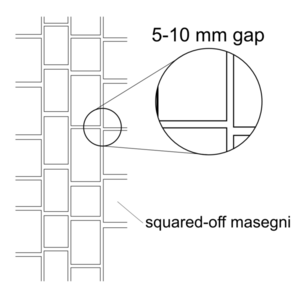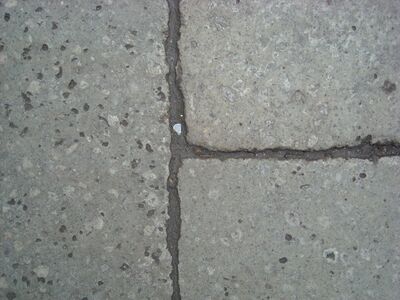Closed Joint (''Giunto Unito''): Difference between revisions
Jump to navigation
Jump to search
Created page with "right|thumb|300 px|A diagram of the closed joint This jointing technique, known as ''giunto unito'' or "closed joints", is used in layouts..." |
No edit summary |
||
| Line 1: | Line 1: | ||
[[File:joint--closed--top-view.png|right|thumb|300 px|A diagram of the closed joint]] | [[File:joint--closed--top-view.png|right|thumb|300 px|A diagram of the closed joint]] | ||
This jointing technique, known as ''giunto unito'' or "closed joints", is used in layouts using new [[Masegno]] or [[Salizzone]] because these [[Paving Stones|stones]] have more uniform and exact dimensions. The joints in this technique are 5-10 mm and are filled in with dirt thus creating a more historic appearance which better suites Venice's aged appearance. This jointing technique is used mainly in the [[On the Run|Running]] and [[Herring Bone]] pavement styles.<ref>Ing. Lorenzo Bottazo, Nov 3, 2011 </ref> | This jointing technique, known as ''giunto unito'' or "closed joints", is used in layouts using new [[Masegno]] or [[Salizzone]] because these [[Paving Stones|stones]] have more uniform and exact dimensions. The joints in this technique are 5-10 mm and are filled in with dirt thus creating a more historic appearance which better suites Venice's aged appearance. This jointing technique is used mainly in the [[On the Run|Running]] and [[Herring Bone]] pavement styles.<ref>Ing. Lorenzo Bottazo, Nov 3, 2011 </ref> | ||
[[File:Joints. | [[File:Joints.jpg|left|thumb|400 px|A closed joint in a street pavement]] | ||
{{-}} | {{-}} | ||
Revision as of 17:46, 6 December 2012

This jointing technique, known as giunto unito or "closed joints", is used in layouts using new Masegno or Salizzone because these stones have more uniform and exact dimensions. The joints in this technique are 5-10 mm and are filled in with dirt thus creating a more historic appearance which better suites Venice's aged appearance. This jointing technique is used mainly in the Running and Herring Bone pavement styles.[1]

See Also
References
- ↑ Ing. Lorenzo Bottazo, Nov 3, 2011
Bibliography
NULL
External Links
NULL